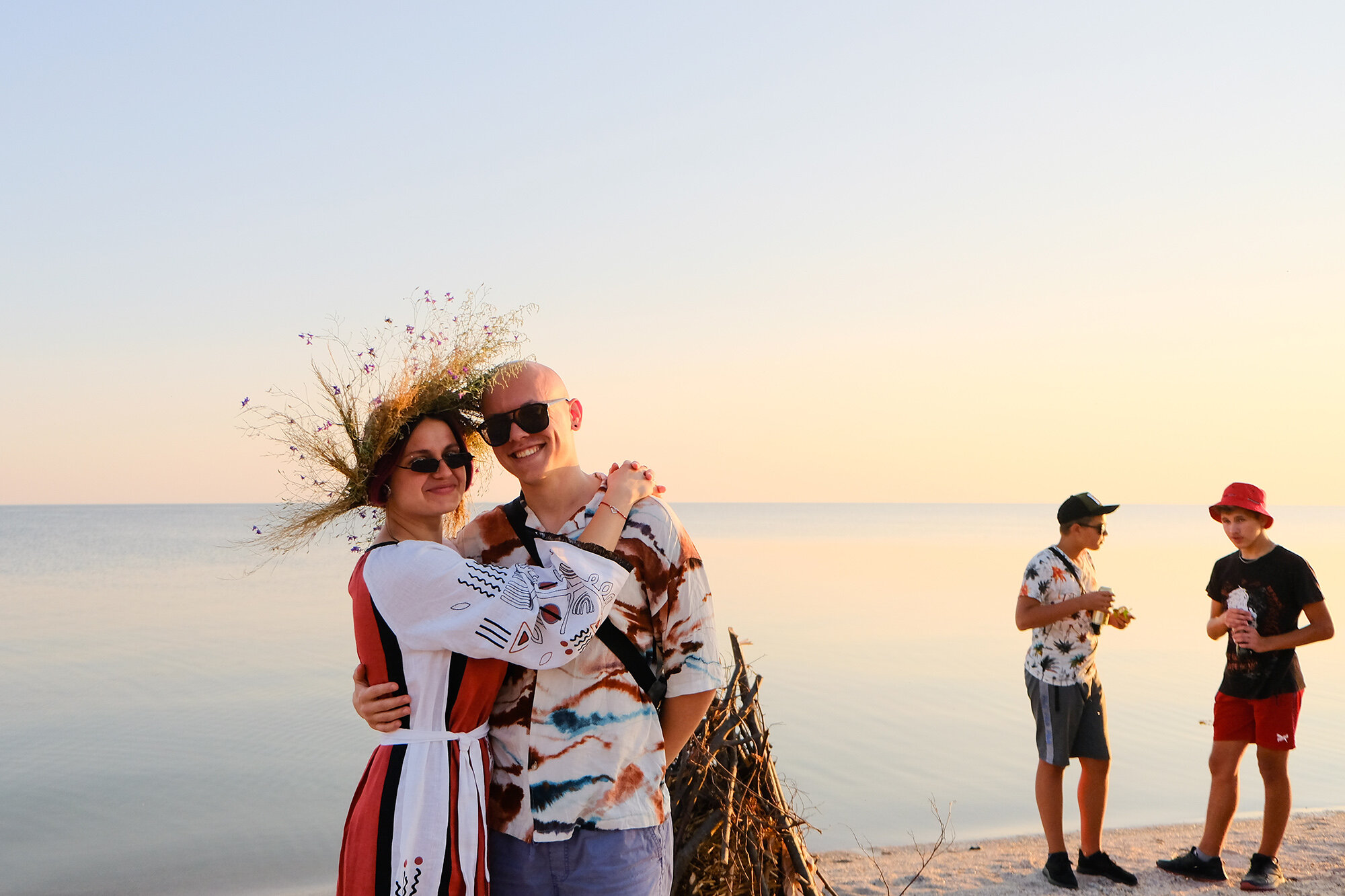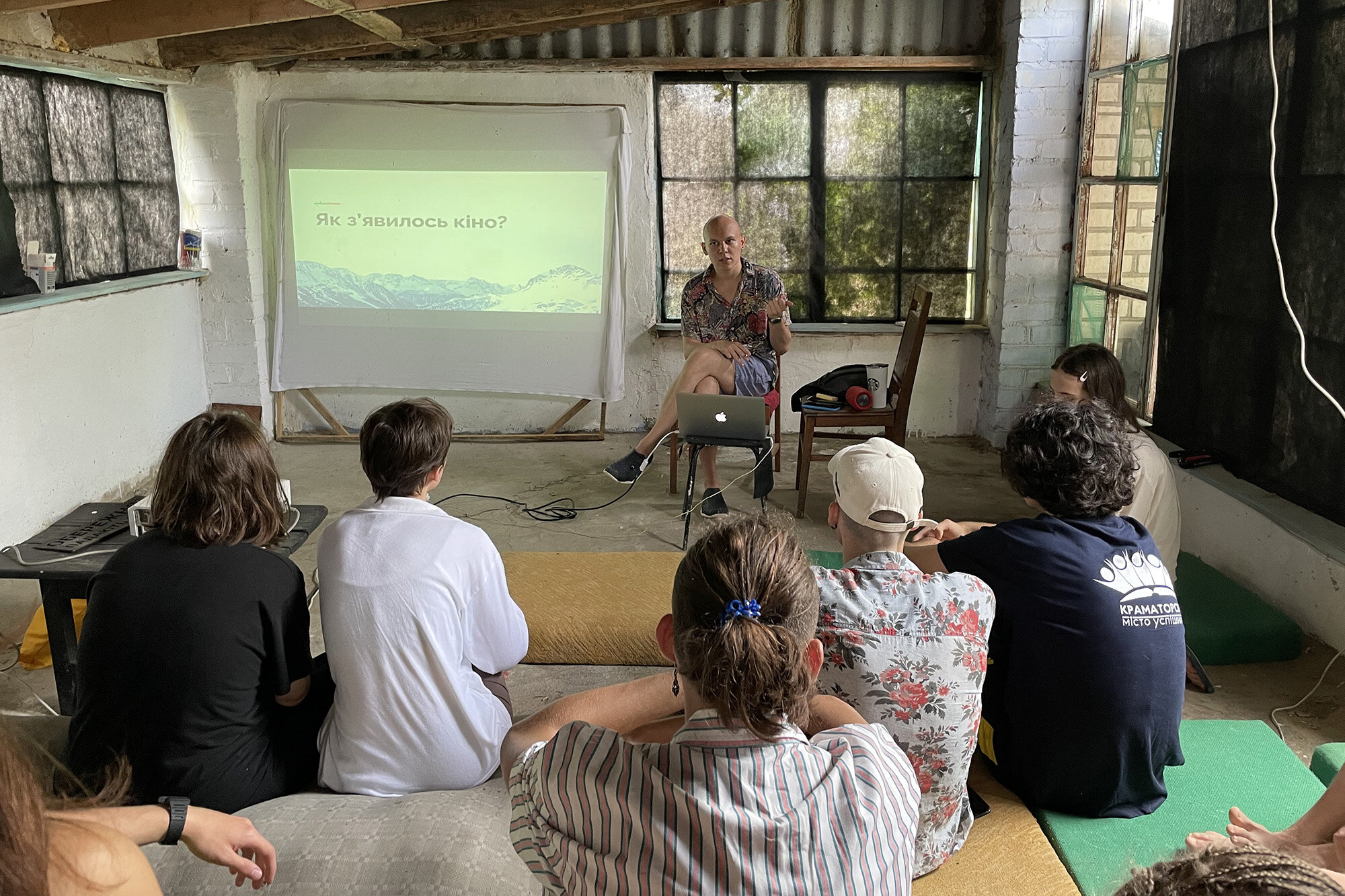OLEKSANDRIVKA, Ukraine — The village of Oleksandrivka in Kherson Oblast has lived in a bubble for years – few visitors would travel to this settlement of 2,500 people, 560 kilometers south of Kyiv.
The local life is similar to what travelers would find in most of rural Ukraine. Locals have a distinct dialect that might be hard to understand, babushkas who have known each other since birth and teenagers drinking alongside cows on the road. Even time seems to move a little slower here.
But in July, the unhurried routine of Oleksandrivka was shaken up by a group of youngsters arriving for the film camp Cinemacoast, arranged in one of the houses in the village.
Twelve participants from all over Ukraine came to take cinema classes and film the local color.
“Cinemacoast is done in these unique settings, where people come to live in a village and get to know this type of life,” Vitalii Havura, one of the mentors of Cinemacoast, told the Kyiv Post. “So that they understand what Ukraine is from the inside.”
But what was meant to be an educational two-week program for filmmakers ended up having a bigger impact by offering villagers an alternative look at their community.
Alien art
The film camp was founded by theater director Andriy May and producer Yevheniia Vidishcheva. Their organization, Vidlik Projects, previously arranged art camps traveling to small towns throughout Ukraine.
Because of the toll pandemic took on travel, the two decided it was time to buy a house and have their own location to gather and create.
Pooling their own money, Vidishcheva and May bought a house in Oleksandrivka in 2020, renovated it into an art residence and called it Youkh – a name that sounds similar to Russian “south,” but also stands for “you coming to Kherson Oblast.” Other creatives and friends, including screenwriter and director Havura, helped the two throughout.
They hosted workshops, concerts and film screenings, posting advertisements and invited locals to join events. But only dance parties proved successful.
“At first we were disappointed, but I understood this is a village where nothing ever happened in terms of the arts,” Vidishcheva told the Kyiv Post. “This is a problem with small villages and towns, that culture doesn’t reach these places.”

The Cinemacoast film camp’s program curator Yevheniia Vidishcheva and mentor Vitalii Havura pose for a photograph at Oleksandrivka’s Ivana Kupala celebration on July 9, 2021. (Asya Romanova)
A year after its foundation, Youkh was finally fully renovated, just in time to win its first major grant for a documentary filmmaking camp. The 9,000 euro budget was provided by the House of Europe, a program financed by the European Union, and Goethe-Institut Ukraine.
Political art
Cinemacoast picked 12 participants out of more than 100 applicants. Aged 15-24, the young filmmakers included two foreigners and 10 Ukrainians studying or working all around Ukraine.
The two main mentors guiding the program were Havura and German director Jakob Preuss, with Vidishcheva as curator.
After the 2013-2014 EuroMaidan Revolution ignited an art revival in Ukraine, Vidishcheva understood that art can be a tool to change her country.
“Art is political. An artist doesn’t exist without a position,” Vidishcheva says. “They are always expressing, they are always against something or in agreement.”
This was why she and Havura wanted to create the film camp, so that there would be more young talented Ukrainians creating influential art.
The program included filmmaking lectures, film screenings, discussions and opportunities to zoom in with directors such as Iryna Tsilyk, the director of the Ukrainian critically acclaimed documentary “The Earth is Blue As an Orange” and others to discuss the production process, networking, festival tours, and other questions.

The participants of the Cinemacoast film camp listen to program mentor Vitalii Havura during a lecture on July 5, 2021. The program included film screenings and discussions in addition to the filming of locals at the village of Oleksandrivka in Kherson Oblast. (Elina Kent)
“We wanted to emphasize professionalism,” Havura says. “We invited professionals in our spheres, directors, curators who are successful in Ukraine.”
After acquiring new knowledge, the participants were instructed to find an extraordinary story in Oleksandrivka and capture it in a short documentary produced by the end of the program.
Havura believes it’s important that artists get to see life as it is at a young age, disagree with it, feel unhappy about it or be touched by it.
“And tomorrow they will do something to change the life in our country,” Havura says.
Engaging art
The group of participants stood out in Oleksandrivka with their city slicker looks and film equipment. The locals were intrigued, but still didn’t fully understand why people from all over the country would choose to come to their village.
Ruslan Harlamov, 18, who works at the fisherman’s house next door to Youkh, thought the participants of the program didn’t fit in with the village at first.
“You artists are all strange looking — guys with long hair, earrings and strange outfits,” Harlamov told the Kyiv Post.
But the village opened up to the new visitors, as participants helped babushkas dig up potatoes, drank coffee with schoolteachers and chatted with locals at the market.
As the participants were welcomed into the village life, they witnessed and filmed local street fights, a teenage breakup drama and elderly people singing for joy.
Havura says that every filmmaker had found something to spotlight.
“I was waiting for those moments when every person would run back after filming and their eyes would be lit up,” Havura says.
The camp presented all documentaries at a premiere screening at the program’s end. The same hall that previously stood empty during film screenings, was packed with locals.
Uniting art
Villagers gathered and stood at the back of the hall during the two-hour screening. They wept, laughed and shouted when they saw familiar faces on the screen.
The film “Childhood” featured pensioner Maria Fedorovna, who years ago took care of the village children, who are now fully grown, with kids of their own. After the screening, she was asked to stand up, and the audience members, many of whom she took care of, thanked her for her kindness. She returned the thanks with tears in her eyes.
Another film, entitled “Storyteller,” followed the village’s “crazy man,” Igor Goman, a strange and lonely 49-year-old, who spends his time writing stories and playing with the local children.
A pair of women sat behind Oleksii Yeroshenko, the director of the film, and were surprised that someone thought a film about Igor would be interesting.
“I was afraid that people wouldn’t take him seriously,” Yeroshenko told the Kyiv Post.
But against the expectations, the film was warmly received, giving Goman an opportunity to be heard, something he desperately sought but could not find.
After thunderous applause following the screening, Svetlana Moroz, the director of the local house of culture stood up. “We understand that we as a community may have failed Igor (Goman). And that we need to listen,” she said.
Dmytriy Zaharov, 19, was among locals who attended the premiere and was touched by the stories of fellow villagers.
“I hope that after watching these works the locals will change their perspective on life,” Zaharov told the Kyiv Post.
While this might take a while, Zaharov says he has already noticed some changes.
“In the past, everything was monotonous,” he says. “But now that these strange people shook things up, the locals are curious about other events and interesting people.”
